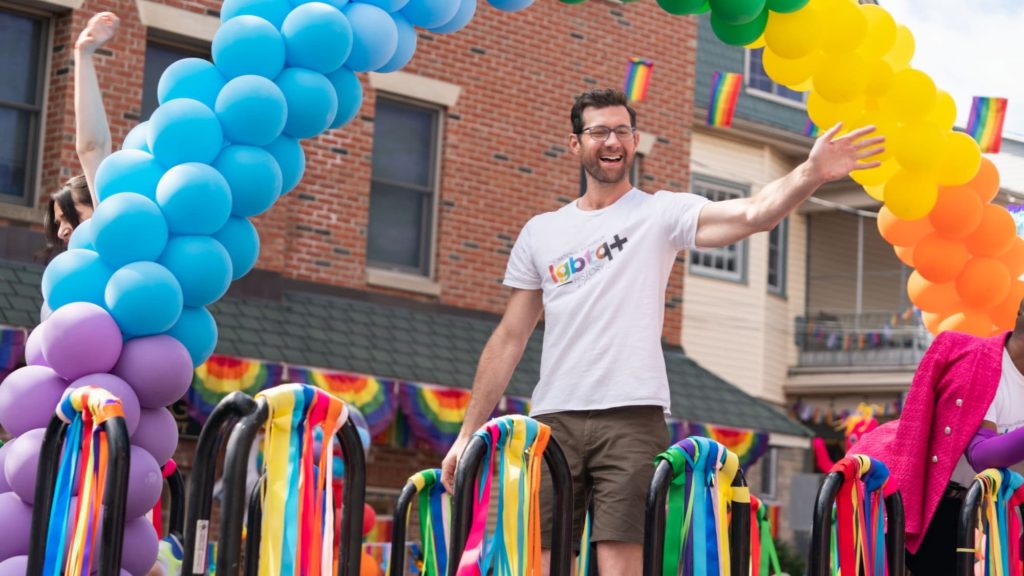People don’t like feeling like they’re being preached to. This is a problem for Bros. Protagonist Bobby (Billy Eichner) is a queer issues podcaster and chairperson of an LGBTQ+ museum, and he spends a lot of his time ranting to other characters about how queer people are under- and misrepresented in the culture. This is not-so-subtly a rant towards the audience, too: Eichner, also the co-writer with director Nicholas Stoller, practically dares us to push back against Bros for using mainstream romcom tropes but for an unabashedly gay story. This is not Love, Simon, which so warmly pats its hero and its audience on the back; this is a raunchy, occasionally abrasive comedy with characters who are often off-putting.
In fact, this feels a lot like a Judd Apatow movie, whose movies have annoying heroes but were still lovable (I mean, before they turned into dumpster fires). Sure enough, Apatow, along with Stoller and Eichner, produces the movie. It’s all here in classic 40 Year-Old Virgin or Knocked Up style: A man who’s emotionally stunted falls for someone who is his opposite and far more attractive than him. Across a shaggy, overlong runtime that leaves plenty of space for noodling gags and character riffs, the man not only falls in love, but becomes a happy, more highly-functioning member of society.

When it’s doing its normal romcom thing, Bros is charming and quite funny. Bobby falls for the easygoing hunk Aaron (Luke Macfarlane) who likes hockey and Garth Brooks. Macfarlane is terrific as a romcom co-lead and “glue guy.” What he lacks in projecting depth, he makes up for in excellent chemistry with Eichner and a warm, reassuring presence on screen. He almost, but not quite, convinced me that Aaron could fall for the neurotic Bobby. I suppose this is the equivalent of a movie telling us that Mila Kunis and Kristen Bell could fall for dad-bod Jason Segel in Stoller’s other Apatovian romcom, Forgetting Sarah Marshall.
The frankness of Bros’ queer themes is a mixed bag. Sometimes the approach works as a subversive remix of familiar beats. The sex scenes are frequent and used for both romance and comedy — in other words, they way they normally would in any other R-rated comedy — and the mere fact that their directness feels somewhat radical in a mainstream film proves the point that Eichner and co. are trying to make. On the other hand, the thematic zeal for the queer material is often exhaustingly didactic and stapled on, especially when Bobby attends meetings for the museum where he works and they literally debate how to get people to appreciate gay culture more.

The movie’s plotting is occasionally a bit wonky. The movie ends with Bobby performing a song. It is an aggressively corny moment, and also baffling. The song’s emotional significance is introduced about three lines before her performs it, so it doesn’t feel much like a culmination. The movie forgets some of its character threads: it essentially ditches the podcast element of Bobby’s life after five minutes in. And Bros doesn’t quite know what to do with the third-act breakup, extending it for a scene or two too long and never finding anything interesting to do with romantic foil Jason (Jai Rodriguez).
But, overall, this is a pretty good comedy (there’s a moment where Bobby gets “roid rage” that made me laugh harder than almost any other scene this year) and a pretty good romance. I was happy they ended up together. So, I guess Bros’ desire to be a normal, mid-budget, raunchy romcom but gay ultimately works, if just barely.
- Review Series: 2022: Year in Film
Is It Good?
Good (5/8)
Dan is the founder and head critic of The Goods. Follow Dan on Letterboxd. Join the Discord for updates and discussion.

